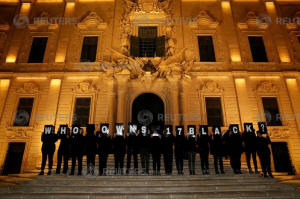|
Exclusive: Mystery company named by
murdered Maltese journalist is linked to power station developer
 Send a link to a friend
Send a link to a friend
 [November 09, 2018]
By Stephen Grey and Tom Arnold [November 09, 2018]
By Stephen Grey and Tom Arnold
VALLETTA/DUBAI, (Reuters) - In February
2017, the Maltese investigative journalist Daphne Caruana Galizia wrote
in her blog about a mystery company in Dubai called 17 Black Limited.
She alleged it was connected to Maltese politicians, but offered no
evidence.
She was unable to discover who owned the company, and it remained
unclear whether 17 Black had any significance.
Eight months later Caruana Galizia was killed by a car bomb, prompting
an international outcry. No evidence has emerged that connects her death
to any of her journalism. But her killing did renew interest in her many
different claims, leading to media reports about such subjects as
banking regulation and Malta's sale of passports. Now Reuters and other
media have begun to unravel another mystery, that of 17 Black.
Two people familiar with the subject in Malta said a report by Malta's
anti-money laundering watchdog had identified Yorgen Fenech, the chief
executive of a Maltese property developer, as the owner of 17 Black. A
third person familiar with the subject in the United Arab Emirates (UAE)
said account records at a bank in Dubai identified Fenech as the owner
of 17 Black. Reuters last month reviewed UAE banking correspondence that
described Fenech as the owner and signatory of a 17 Black account at
Noor Bank in Dubai.

Fenech is a director and co-owner of a business group that won a large
energy concession from the Maltese state. In 2013, that group was
granted the right by the Maltese government to build a 450 million euro
($517 million) gas power station on the island.
When asked to comment, Fenech declined to say whether he owns 17 Black.
The ownership of the company is significant because of another document,
an email written in December 2015 by accountants for two senior figures
in Malta's government. That email was discovered by Maltese financial
regulators among documents obtained from the accountants' firm,
according to a person briefed on the investigation. Its existence has
been reported before and its authenticity has not been challenged.
The two senior political figures concerned are Konrad Mizzi, who was
Malta's energy minister from 2013 to 2016, and Keith Schembri, the prime
minister's chief of staff. Mizzi conceived and promoted the idea of
offering the power station concession.
According to the December 2015 email, Panama companies owned by Mizzi
and Schembri stood to receive payments from 17 Black for services that
were unspecified. The email said the Panama companies expected 17 Black
to be a "main target client," with payments of up to $2 million expected
within a year. The email made no reference to the gas power station
energy scheme and there is no evidence the payments went ahead.
It remains unclear why the Panama companies owned by two senior
political figures expected to receive money from 17 Black.
The December 2015 email was first published in April by the Daphne
Project, a collaboration of news organizations, including Reuters, that
has been carrying on the work of the murdered journalist. In a response
at the time, Schembri said that firms he owned had a business plan to
earn money from 17 Black but that those plans did not go ahead. He did
not elaborate. Mizzi denied all knowledge of 17 Black.
Schembri and Mizzi both told Reuters in October they had no knowledge of
any connection between 17 Black and Fenech, or of any plan to receive
payments connected to Fenech or the energy project. Fenech denied making
any plans to pay any politician or any person or entity connected to
them.
The Maltese firm of accountants that sent the December 2015 email,
NexiaBT, said it could not comment because of client confidentiality.
There is no suggestion that anyone connected with 17 Black was involved
in Caruana Galizia's death. Three people have been charged with planting
the bomb that killed her; they deny the charges. No evidence has emerged
publicly about who ordered the assassination.
Mizzi, who is now Malta's tourism minister, issued a statement through a
spokesman saying he "reiterates that there is no connection, direct or
otherwise, between him, the company or trust he held, and any entity
called 17 Black. Furthermore, he has no information relating to 17
Black."
In a statement to Reuters, Schembri said he had not heard that Fenech
owned 17 Black. He said he was not involved in the power station project
and, asked if he had intended to profit from the project, said: "The
answer is a categorical 'No'."
Fenech said he and his companies "never had (or intended to have) any
untoward business relation" with any politicians or politically
affiliated individuals or entities. "We have always and consistently run
our operations in compliant, transparent and above-board fashion," he
said.
Financial records identifying the owner of 17 Black were first
discovered earlier this year by Malta's anti-money laundering watchdog,
the Financial Intelligence and Analysis Unit (FIAU), according to two
sources briefed on its findings.

Reuters reviewed UAE banking correspondence that summarized 17 Black's
banking activity in Dubai. The documents stated that when 17 Black
opened an account in June 2015 at Noor Bank in Dubai, the company
declared it was 100 percent owned by a Maltese citizen called Yorgen
Fenech. The correspondence also said Fenech is the account's sole
signatory.
The only "Yorgen Fenech" listed on Malta's electoral roll and company
register is the power station developer.
In the spring of this year, the FIAU passed Fenech's name to Malta
Police's Economic Crime Unit as part of a wider examination of energy
deals conducted by the government.
Malta Police said it was prevented by law from confirming whether it had
received any information from the FIAU and whether any investigation was
under way. In a statement, the FIAU declined to comment on 17 Black
because of "secrecy obligations" under Maltese law.
A UAE government official, who was unwilling to be named, said UAE
financial and law enforcement authorities were examining 17 Black's
activities after a request for assistance from Maltese authorities. The
official declined to elaborate.
In July 2017, more than a year after Caruana Galizia had mentioned the
Panama companies owned by Mizzi and Schembri in her blog, a Malta
magistrate ordered a judicial inquiry into whether the companies
involved any illicit activity. Opposition politicians in Malta and
members of the European Parliament called for Mizzi and Schembri to be
suspended from office while that inquiry was conducted. The island's
prime minister, Joseph Muscat, declined to do so.
In May this year, another magistrate ordered that 17 Black's activities
should also be examined as part of the same probe. The inquiry is
currently stalled, pending a legal challenge made on procedural grounds
by Mizzi, Schembri and others. Both Mizzi and Schembri have said they
would welcome testifying and disproving any allegations made against
them before any inquiry.
In a statement to Reuters this month, referring to the judicial probes,
Kurt Farrugia, the prime minister's spokesman, said that as the
activities of 17 Black were under investigation, Muscat would "await the
conclusion of this process and act accordingly. He has been consistent
on this point." The prime minister, Farrugia said, did not know who
owned 17 Black.
OLD FRIENDS IN POWER
Before he became a government minister, Mizzi worked as a management
consultant. In September 2012, he became energy spokesman for Muscat's
Labour Party. In January 2013, at the start of a general election
campaign, Mizzi proposed an ambitious plan to reform Malta's energy
sector.
Mizzi said the proposals, which counted on private investment to build a
gas power station, would cut the country's bill for energy generation by
187 million euros a year. Muscat said he would implement the plan.
Labour won the March 2013 election. Muscat became prime minister and
appointed Mizzi energy minister.
Mizzi and the government proceeded with the energy plan, and several
deals were struck by October that year. One deal granted a concession to
a private business group, selected from several bidders, to build and
run the new gas power station. Under the selection procedure, Mizzi
played no direct role in choosing the winner.
The winning group - which included Maltese investors, Azerbaijan's state
oil company SOCAR, and the German company Siemens – was set up in 2013
and called Electrogas Malta. Fenech, the Maltese property developer, was
a director and an investor. The 450-million-euro Delimara power station
was completed in 2017.
[to top of second column]
|

Activists from Occupy Justice Malta hold up placards reading "Who
Owns 17 Black?" in reference to revelations by the Daphne Project,
outside the office of Prime Minister Joseph Muscat at Auberge de
Castille in Valletta, Malta May 15, 2018. REUTERS/Darrin Zammit Lupi/File
Photo

Siemens declined to comment on whether Fenech owned 17 Black, or
about Mizzi and Schembri's potential business connection, saying
"Siemens is not in a business relationship with the company." SOCAR
Trading, the subsidiary of SOCAR involved in the power station
project, said it "has no knowledge of the company 17 Black."
In July 2015, Mizzi bought a shell company in Panama called
Hearnville Inc, registering his ownership via an anonymous trust in
New Zealand, according to corporate records and public statements
later made by Mizzi. At the same time, Schembri acquired a Panama
company, called Tillgate, also via a New Zealand trust.
Schembri, a businessman, had known Muscat, Malta's prime minister,
since they were at school together in the 1990s. Schembri became
Muscat's chief of staff in 2013. When he did so, he resigned his
directorships of his Maltese printing and stationery business, but
remained the owner. Schembri said his position in the prime
minister's office gave him "no involvement" in the power station
project.
When Hearnville and Tillgate, the two Panama companies, sought to
open bank accounts, they were asked to list their likely sources of
revenue. Accountants acting for Mizzi and Schembri sent an email on
Dec. 17, 2015, to a Panamanian law firm that was assisting the
search for a suitable bank. The email named 17 Black Limited and
another company, Macbridge Limited, as the "main target clients"
from whom banks could expect payments to Hearnville and Tillgate.
Mizzi and Schembri were asked this month by Reuters if they had
knowledge of the email before it was sent. Schembri replied "No",
without elaborating either about the email or what he knew of 17
Black. Mizzi replied that he "did not see the alleged email you are
referring to prior to its publication."
Asked about Hearnville and Tillgate, Fenech told Reuters that
"neither I, nor any company/entity of which I am or have been
involved in, have ever had (or had the intention to have) any
relation whatsoever with the entities you mention." Asked to clarify
whether he owned or had any relation to 17 Black, Fenech did not
respond.
Brian Tonna, head of NexiaBT, the accountancy firm that sent the
email, said he was prevented by client confidentiality from
commenting. He added that the firm was cooperating fully with the
authorities.
The December 2015 email said both 17 Black and Macbridge were
registered in Dubai. Reuters found no trace of Macbridge. The
banking correspondence reviewed by Reuters indicated 17 Black was
registered in the nearby emirate of Ajman and opened an account at
Noor Bank in Dubai in June 2015.
The person familiar with 17 Black's arrangements in the UAE said 17
Black was a "flexi-desk company," a business that could be created
without a physical presence in the country. Around 9 million to 10
million euros went through 17 Black's account at Noor in 2015, the
person said, after which the account became dormant. Reuters could
not confirm those figures.
The source said that most of the money paid into the 17 Black
account had swiftly moved on to other entities, though it had
retained a balance of about 2 million euros. Based on the absence of
evidence for the business purpose of these in-out transactions, Noor
Bank froze the account in September, the source said.
In a statement, Noor Bank declined to confirm any details of the
bank account or its actions, saying it was "legally precluded from
any unauthorized disclosure of confidential customer information"
but always complied with any formal requests for information from
authorities.

Maltese financial investigators have traced two payments to 17
Black, according to a source briefed on the investigation and a
draft FIAU report from 2017 seen by Reuters. One was $200,000 sent
to 17 Black on July 10, 2015, from Orion Engineering Group Limited,
marked as provision of "manpower" in Qatar. Orion is a Maltese
company owned by Maltese businessman Mario Pullicino, according to
the report and public corporate records. Pullicino was also a
company secretary of Armada Floating Gas Services Malta Limited.
Armada was set up in June 2015. It provided a gas storage tanker for
the new power station commissioned by Mizzi.
Pullicino confirmed to Reuters making the $200,000 payment and said
it was for work unrelated to the Malta gas project. Speaking by
telephone, he declined to provide further details of the
transaction, 17 Black or its owners. He said his company "has never
paid any money to any politically exposed people."
Pullicino did not respond to further questions about whether he knew
17 Black was owned by Fenech.
Another payment to 17 Black consisted of $1.5 million sent in
November 2015 by Mayor Trans Limited, a Seychelles company with a
bank account in Latvia, marked as for "financial advisory services."
Mayor Trans, according to public U.S. regulatory filings relating to
that start-up, is ultimately owned by an Azeri citizen named Rufat
Baratzada. The address given for Baratzada in U.S. regulatory
filings is a modest apartment in Baku, the capital of Azerbaijan.
Neighbors there described 51-year-old Baratzada as a former subway
worker.
His family, contacted at Baratzada's new one-storey home at end of
an unpaved road on the outskirts of Baku, said he was now working as
a security guard on a construction site in Baku. Reached by
telephone and asked whether he owned Mayor Trans, Baratzada said:
"If it's me, it's me." He declined to talk further.
POLITICALLY EXPOSED
Through the autumn of 2015, the Panama companies acquired by Mizzi
and Schembri applied to open bank accounts in Panama, Miami, Dubai,
St. Lucia and the Bahamas, according to evidence assembled by
Malta's financial investigators from emails, obtained directly from
the offices of Maltese accountants for Mizzi and Schembri, and
detailed in the draft FIAU report. Copies of the emails were also
contained in the Panama Papers and shared with Reuters by the German
newspaper Süddeutsche Zeitung, which first obtained the Panama
Papers.
According to those emails, opening bank accounts proved tough. The
biggest obstacle, the emails indicated, was that the ultimate owners
were politicians.
Financial institutions are obliged to take special care in handling
customers designated as "politically exposed persons," or PEPs -
people entrusted with a prominent public function or their families.
Banks shy away from handling the money of PEPs if they are unsure
about the source of it.
The emails show that efforts to open accounts for the Panama
companies of Mizzi and Schembri continued until February 2016. That
month Caruana Galizia and other Maltese media reported the existence
of the Panama companies. Mizzi and Schembri then commissioned audits
of the New Zealand trusts they had set up to hold the shares of
their Panamanian companies. Both audits were conducted in October
2016 by an office of Crowe Horwarth accountants in Wellington, New
Zealand.
The firm declined to comment on questions from Reuters. In notes
attached to the audits published by Mizzi and Schembri, the
accountants said that the audits were based on "sufficient and
appropriate evidence." The audits stated the Panama companies had
carried out no trading activities and that neither had a bank
account.

In March last year, 17 Black changed its name to Wings Development,
according to the person familiar with 17 Black's arrangements in UAE.
An official at Ajman Free Zone said Wings Development was still
registered there but provided no evidence. Reuters could locate no
company of that name for comment.
(Additional reporting by Margarita Antidze in Tbilisi, Maria
Tsvetkova in Moscow and Jacob Borg of the Times of Malta in
Valletta; Editing By Richard Woods.; This story is part of the
Daphne Project, coordinated by Forbidden Stories, a Paris-based
group that continues the work of journalists silenced through murder
or imprisonment)
[© 2018 Thomson Reuters. All rights
reserved.]
Copyright 2018 Reuters. All rights reserved. This material may not be published,
broadcast, rewritten or redistributed.
Thompson Reuters is solely responsible for this content. |